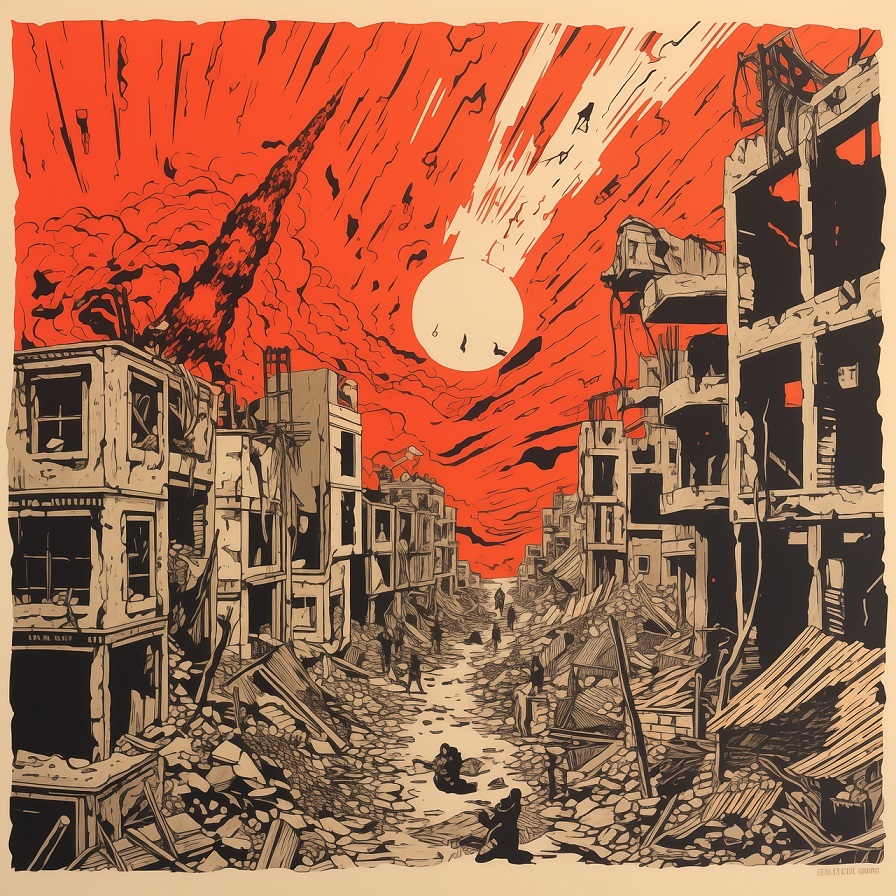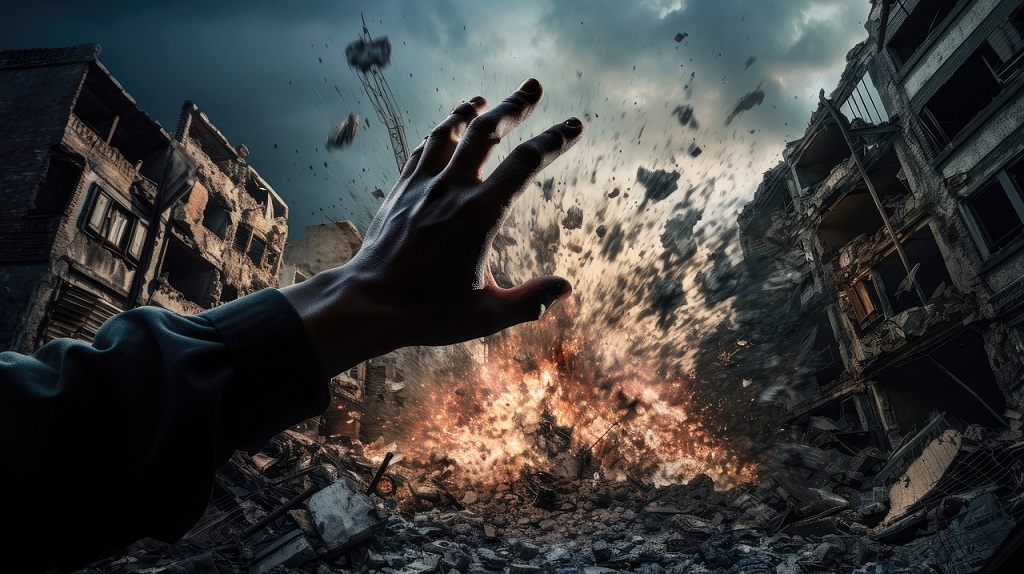Israel’s government is not doing anything different now from what it has done since it was first inaugurated as a state. Creating a national entity was at the time a decision inspired by colonialism.
 Juan Diego García
Juan Diego García
And faithful to that inspiration, the Jewish population brought deliberately from Europe and increasingly from America, proceeded to oust the previous occupants through violence (direct or indirect).
In this way it created the so-called settlements and caused the massive displacement of the original inhabitants, mostly Muslims, although there were also Christians of various strains and even Jews, those who never left Palestine.Until Israel’s creation, the co-existence of all these ethnicities and groups had been mainly peaceful and the conflicts recorded until then had been manageable and never caused wars or massive displacements.
More or less the same thing has happened with the current Jewish communities that live without any great problem in the north of Africa and in Asia, integrated into predominantly Muslim countries.
Two things allow us to understand the process of Israel’s creation and subsequent development. The first is political in nature and responds to the needs of the traditional, colonial powers, particularly the United Kingdom but also now the United States as a new colonial power.
 Beyond the humanitarian motivation of the European powers after the historical persecution of the Jews most criminally in the so-called holocaust, European governments – claiming that the Jews had to be compensated for the persecution they were subjected to for centuries and not just in Germany – were really trying to create a solid base to protect their interests in the complex new international relations web following the Second World War.
Beyond the humanitarian motivation of the European powers after the historical persecution of the Jews most criminally in the so-called holocaust, European governments – claiming that the Jews had to be compensated for the persecution they were subjected to for centuries and not just in Germany – were really trying to create a solid base to protect their interests in the complex new international relations web following the Second World War.
Strategies and politics
From its beginnings Israel has been then a key tool of the capitalist powers and it continues to play that role.
Without the West’s support, this colonial instrument would not have lasted long. At best, it would have had to choose to maintain the previous Palestine as a land of varied ethnicities and beliefs and of peaceful co-existence between diverse peoples. It was incumbent on the traditional capitalist powers to create Israel as a sort of enormous military base that underpinned their strategic interests in the new world order.
Consequently, it is only if some type of agreement can be reached between the traditional powers (basically the United States and western Europe) and new powers (such as China and Russia, in particular) that any reasonable solution will be feasible, and it would require Israel to change its current political and military role.
Only then would it be possible to create a sort of judeo-palestinian federation, a single state in which Jews, Muslims, Christians and other ethnic groups could co-exist peacefully, along with non-believers who, although a minority, remain an important reference which could serve as a link between the other groups.
 A modern, civilised and peaceful state would emerge. Of course, internal dynamics could help or hinder the problem’s solution, but it is unlikely that happy event would occur without the decisive role of the international powers that support the conflict.
A modern, civilised and peaceful state would emerge. Of course, internal dynamics could help or hinder the problem’s solution, but it is unlikely that happy event would occur without the decisive role of the international powers that support the conflict.
Palestinians and Israelis
The second element relates to the vision held by the conflict’s direct protagonists, Palestinians and Israelis. Each of them has multiple factions which makes it difficult to find viable solutions. As well as Muslims and Jews, there are many Christians who, while culturally linked to one of these factions, are far from professing any religion or who merely share religious and other celebrations.
Zionist extremists justify the violent colonisation of Palestine as a gift from their god (Jehovah) who designated them the “chosen people” and Palestine the “promised land”, basing their narrative on the Torah.
In the end this is about stories that are profoundly fanatical, racist, xenophobic, impregnated with homophobia and an extreme patriarchalism, all of which makes civilised dialogue based on reason almost impossible.
There are exceptions, such as some groups of orthodox Jews who distance themselves from Zionism. They are a minority, but they are important in the context of dialogue and civilised solutions to the Israeli-Palestinian conflict.
 If one wants to reach a civilised and fair solution for all groups involved, every group will need to be included, especially the ones that existed before the Zionist state’s creation, many of which came from Europe. These latter groups (notably the ones originating in Russia) were in so many ways supporters of an almost pure communism and were the first promoters of the kibbutz. They proclaimed the humanist message without any exclusions and practiced freely the nineteenth century workers’ movement principle that “each man contributes as his means allow and receives according to his need”. However, the kibbutzim became an extreme form of Zionism, abandoned the pure communism of their origins and turned into yet another form of colonisation of Palestine. They uprooted violently entire populations, burning their modest homes and destroying their food-producing land.
If one wants to reach a civilised and fair solution for all groups involved, every group will need to be included, especially the ones that existed before the Zionist state’s creation, many of which came from Europe. These latter groups (notably the ones originating in Russia) were in so many ways supporters of an almost pure communism and were the first promoters of the kibbutz. They proclaimed the humanist message without any exclusions and practiced freely the nineteenth century workers’ movement principle that “each man contributes as his means allow and receives according to his need”. However, the kibbutzim became an extreme form of Zionism, abandoned the pure communism of their origins and turned into yet another form of colonisation of Palestine. They uprooted violently entire populations, burning their modest homes and destroying their food-producing land.
Freeing Gaza
The Muslims have in their formal government (the so-called Palestinian National Authority) an entity that is useless due to its impotence and subjugation to the Zionist government.
t seems Israel’s government does not even consider it viable to hand over Gaza (after the destruction) to its administration, which would be basically in the hands of occupants from Israel, the United States and its western allies along with a few friendly Arab governments.
 At present, it is unknown what Zionism will do with Gaza’s population of two-and-a-half million.
At present, it is unknown what Zionism will do with Gaza’s population of two-and-a-half million.
It is rumoured that the best case scenario is that they will remain there, controlled strictly (and illegally however one looks at it) by Israel.
Other sources mention Zionism negotiating with Arab countries (Egypt, especially) to they take in displaced Palestinians. There are also rumours of a massive forced transfer to some African country (the Democratic Republic of the Congo?). In addition to the Palestinian National Authority, Hamas of course (who won Gaza’s last election with a large majority and apparently has great backing now in the West Bank) and other religiously-inspired groups must be considered. They are generally quite extreme but could eventually moderate their message and reach a reasonable solution.
They all propose the destruction of Israel and the creation of an Islamic state, something which would make a secular, modern and democratic Palestine very complicated.
There exist socialist and communist-inspired groups – the Popular Front for the Liberation of Palestine is probably the best known – but they are less influential than Hamas and the Islamic fundamentalists.
 So far it does not seem realistic that the conflict will spread, obliging the powers involved to look for a solution that at least ends hostilities and, in the best case, achieves some form of peaceful co-existence.
So far it does not seem realistic that the conflict will spread, obliging the powers involved to look for a solution that at least ends hostilities and, in the best case, achieves some form of peaceful co-existence.
Nor is there evidence allowing us to state what will happen with the current Zionist government and if social and political forces will appear in Israel and make a positive change to the prospects of a peace agreement or at least an end to the cruellest and most criminal forms of Zionism, which are not exclusive to the current government but have, basically, been standard practice since Israel was created.
In the end, although it is not said for reasons of co-existence, Israeli society’s different social and political forces still have the objective of “Greater Israel” which would encompass its current territory plus, of course, Gaza and the West Bank, along with Sinai, part of Syria (it already occupies the Golan Heights), Libya and Jordan. And in the minds of the most fanatical, a greater area that would stretch as far as the Tigris and the Euphrates.
(Translated by Philip Walker – Email: philipwalkertranslation@gmail.com) – Photos: Pixabay












.jpg)












